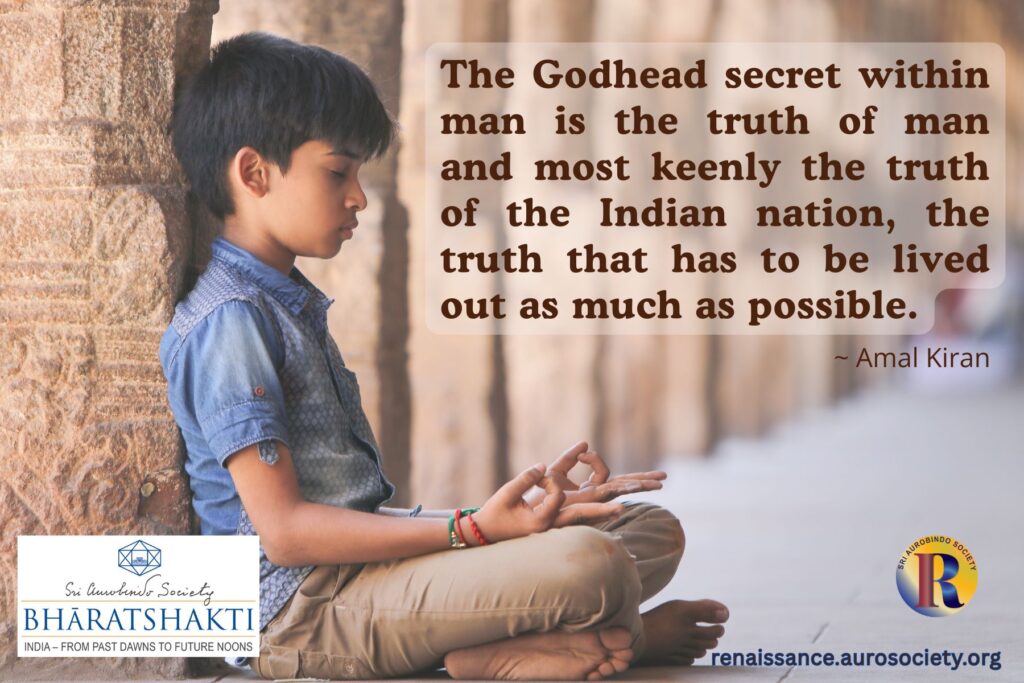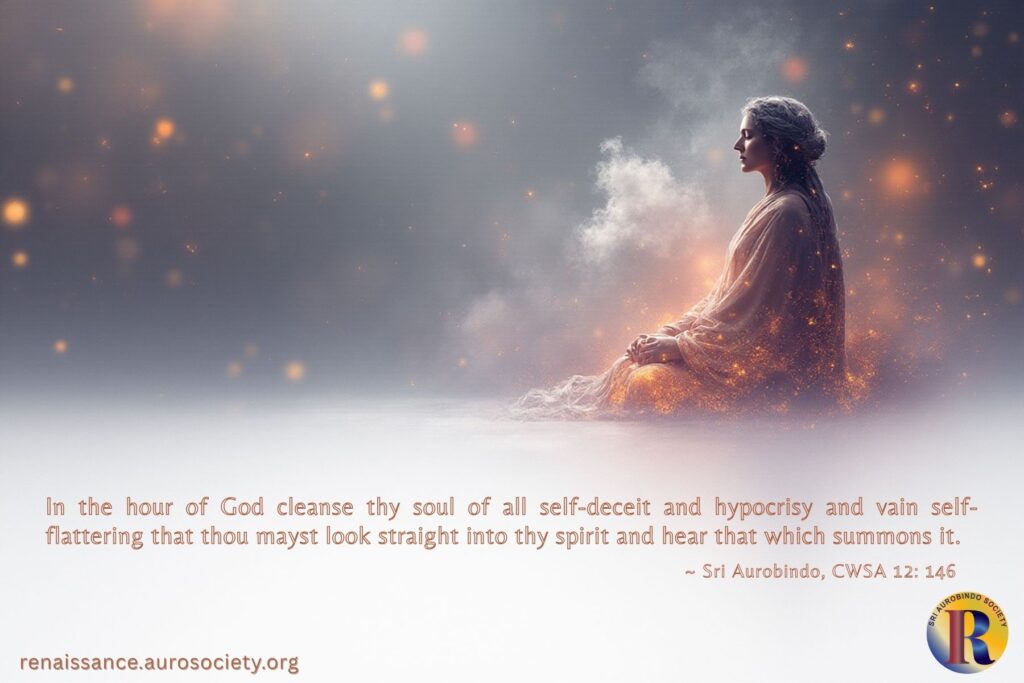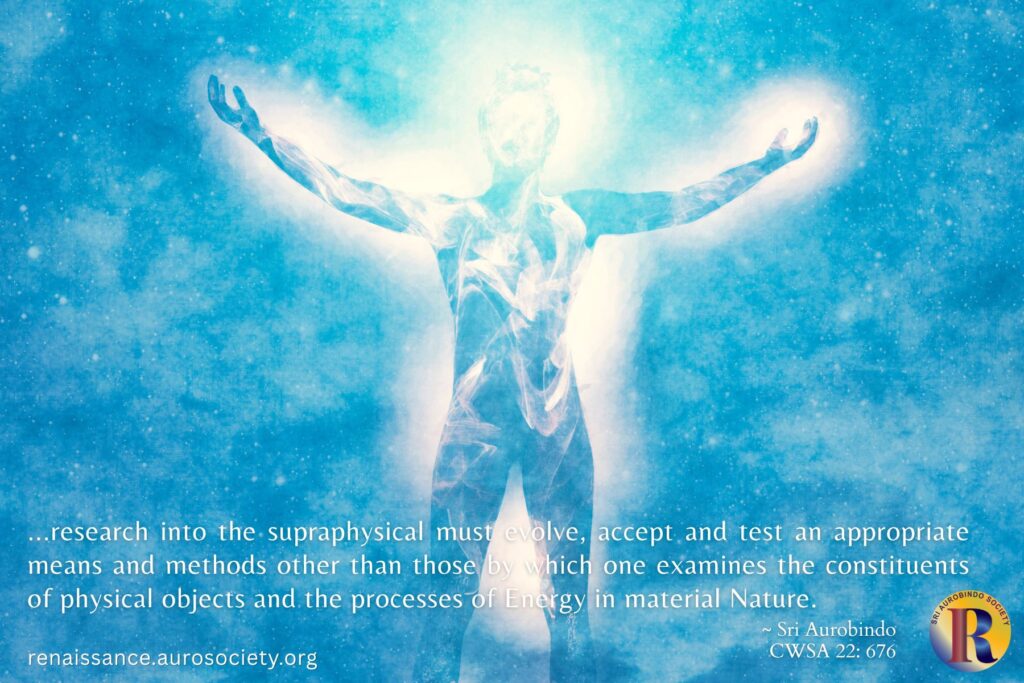Editor’s note: For this special issue, we found a perfect gem by K. D. Sethna (named Amal Kiran by Sri Aurobindo). This piece highlights the vast, integral being of Sri Aurobindo, the Rishi, as well as the greatly endearing personality of Sri Aurobindo, the modern Guru. We also get a glimpse of life in the early years of Sri Aurobindo Ashram.
This personal memoir by Amal Kiran was first published in Mother India, 1972 (Vol. XXIV, no. 10-11, November-December issue, pp. 750-754). He actually wrote this first for a special volume brought out by Sahitya Akademi to commemorate Sri Aurobindo’s centenary, titled Indian Literature, Sri Aurobindo (1872-1950) Birth Centenary Number (pp. 90-94).

I was at college when I first heard of Sri Aurobindo.
I read somewhere that he was a master of English as well as familiar with several other languages both ancient and modern. I also learnt that he was a great Yogi who had the power to appear in many places at the same time!
What impressed my young mind was not so much this alleged power as his multi-linguism. I took it for granted that a great Yogi should be able to flout the common laws of space and time. But I was struck by the fact that this spiritual figure should be at home in such a number of languages and therefore of literatures. Here was somebody who possessed a Light from beyond our earth and yet saw meaning in earthly endeavour and expression.
Such a seer could not but have some meaning for me.
However, I was engrossed in my own pursuits and they were not always such as might lead one to the spiritual path. The analytic intellect had grown rather strong in me and I came to carry like a challenging flame the modern temper of doubt and denial.
During a short period I professed downright materialism and atheism. There was for me no Soul, there was for me no God. An idealistic vein in my nature loved great poetry and kindled up to great art: their “immortal longings” struck a responsive chord in my heart, but the modern temper held sway on the whole and the name of Sri Aurobindo receded into the background.
A series of unexpected events jolted my intellectual self-sufficiency and sent my emotional part looking for a permanence behind transient things, a support of some love which would be eternal and all-understanding. The all-understanding-ness was an important desideratum. For I was quite a bit of a complexity, my mind and character having a great many sides which sometimes drew me in different directions.
I now started searching for a Guru.
A number of Sadhus and Yogis I caught hold of, asking them for some satisfying revelation. It was in this period of a vague Godward turn that I came across a Theosophist who was also an art critic. When he saw that I was on a spiritual quest he said: “Nobody except Sri Aurobindo will satisfy you.”
This was strange, coming from a Theosophist whose world is chockful of occult Masters forming a coterie among themselves and leaving no room for any outsider like Sri Aurobindo. My friend added: “Sri Aurobindo has the Cosmic Consciousness.”
The Theosophist’s testimony in general and this phrase in particular joined up with the memorable impression made by the statement that Sri Aurobindo was a multi-linguist. But I still did not realise the exact nature of the spiritual life which he represented. The basic meaning of his Yoga had not yet gone home to me.
Then a most amazing coincidence happened.
I went to Bombay’s well-known Crawford Market to buy a pair of shoes. I took my purchase away in a box wrapped by the shopkeeper in a sheet of newspaper. On uncovering the box the news-sheet fell back disclosing a big headline: “A Visit to the Ashram of Sri Aurobindo.”
Immediately I devoured the article.
It gave a broad idea of the earth-accepting and life-transforming Yoga practised in the Pondicherry Ashram. All kinds of work, all activities of thought, all movements of literature and art were sought to be taken up into the spiritual life and given their fullest value. I felt nothing in me would be suppressed and discarded, everything would be fulfilled in the light of the Eternal and the Infinite.
I wrote to the Ashram, seeking permission to come and live there. The reply was encouraging. So I made my pilgrimage to Pondicherry in the shoes that had brought me that eye-opener of an article.
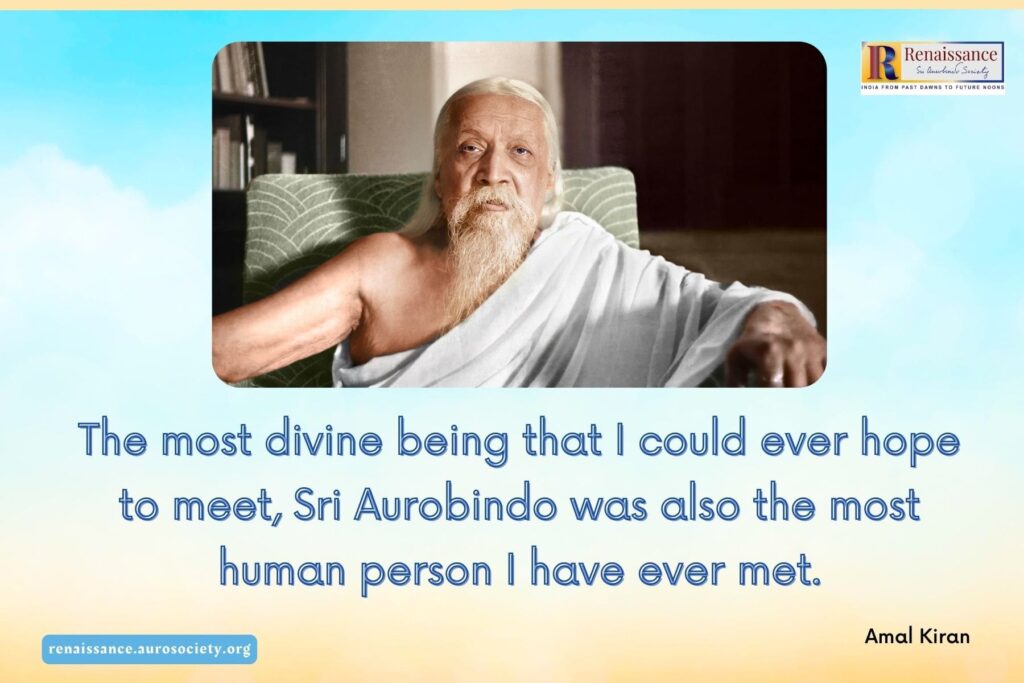
I was twenty-three at the time.
Yoga is not easy on any account – and for a young man it was bound to be pretty difficult at first. For, however life-accepting, no Yoga would be worth its name if the old turns of life were not rectified and dedicated to the Divine. Asceticism was never imposed in the Ashram, but to ‘take everything with an inner detachment and equanimity’ was the constant call. And every minute was meant to be a gesture of remembering the Divine and offering oneself to Him.
A subtle discipline in the midst of a wide freedom lay at the basis of this “Integral Yoga”.
Yes, it was not a smooth canter all the way. But the returns were great. There were intense inner experiences.
The discovery of an inmost self whose very nature is bliss, the sense of being free from the shackles of the body, the enlightening influx of a force from above the brain-mind — these were no small rewards. And the rewards were all the more rich because of the source from which they flowed: the grand personality of Sri Aurobindo, the beautiful presence of his co-worker, the Mother.
And the Master and the Mother came close to us with their gracious abundance of love and light in a thousand ways.
The Mother met us again and again each day, a guide and helper in every problem. The Master, who a year before I joined the Ashram had withdrawn from public contacts in order to concentrate on the momentous work in hand and bring about its consummation sooner, was very far indeed from being a world-shunning recluse.
He kept in touch with us all the time by writing profusely to us in answer to our questions on every imaginable topic. His interest in our literary activities was immense. He carried on his own literary creation too. Up to the end of his life he kept up his correspondence with me.
Not only did he want my self-critical faculty to be on the alert, but also asked me to comment on the epic he had been writing for years, Savitri. Its 23,814 lines of superb blank verse are at once a legend and a symbol and a philosophy, charged everywhere with what the ancient Rishis called the Mantra. Savitri itself sums it up in a Mantric utterance:
Sight’s sound-waves breaking from the soul’s great deeps.
~ CWSA, Vol. 34, p. 383
* * *
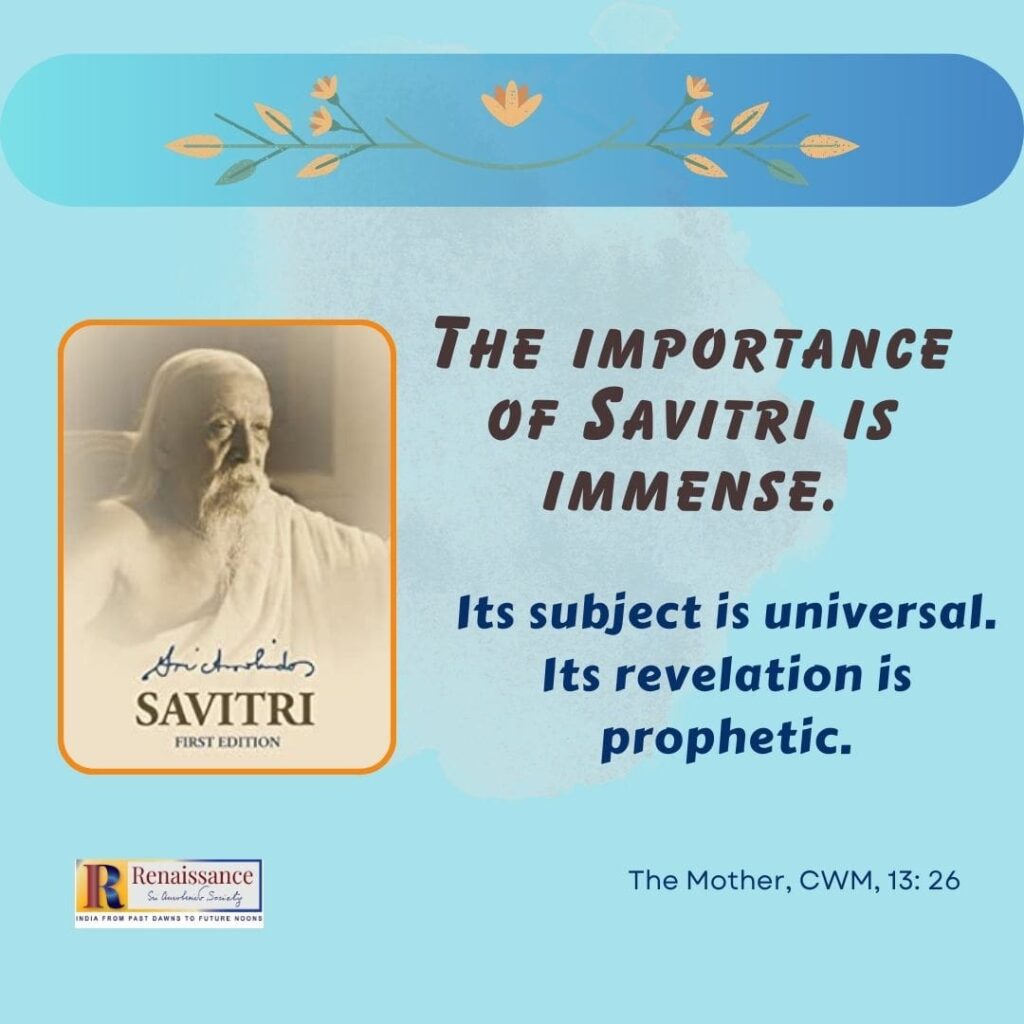
Patiently he considered all that my well-meaning impudence felt to be occasional shortcomings or oversights in the colossal poem. Mostly he demonstrated to me my errors of judgment. But now and again he gladly acted on my suggestions.
Here was a Guru who never sat on a deliberate pedestal. But he built for himself a throne of thrones in our hearts and minds by his intimacy and naturalness and that rare humility which stands always in front of the inexhaustible Infinite whose touch lends “a Yonder to all ends”.
The most divine being that I could ever hope to meet, Sri Aurobindo was also the most human person I have ever met.
Nor was his humanness definable only in terms of his affectionate fatherly attitude which led us onward and upward by the very splendour of spirit he brought so close to us. Its definition has also a deep evolutionary meaning.
Sri Aurobindo represented at the same time descending Godhead and ascending Manhood.
The whole passion of man’s history, the whole arduousness of man’s aeonic adventure lived in him. He was no sudden isolated wonder, not merely a haloed visitor from another and brighter world come down on earth to set our air ablaze for a while and make us eager to go soaring into his empyrean.
He stood as a gatherer-up of all our problems and difficulties into himself, making them part of his own flesh and blood so as to know them from the inside and find their final solution. Repeatedly has he said that unless he had passed through every difficulty to which his disciples were subject and unless he had discovered and exemplified on his own pulses the conquest of them he could never assure us that they could be overcome by us.
* * *
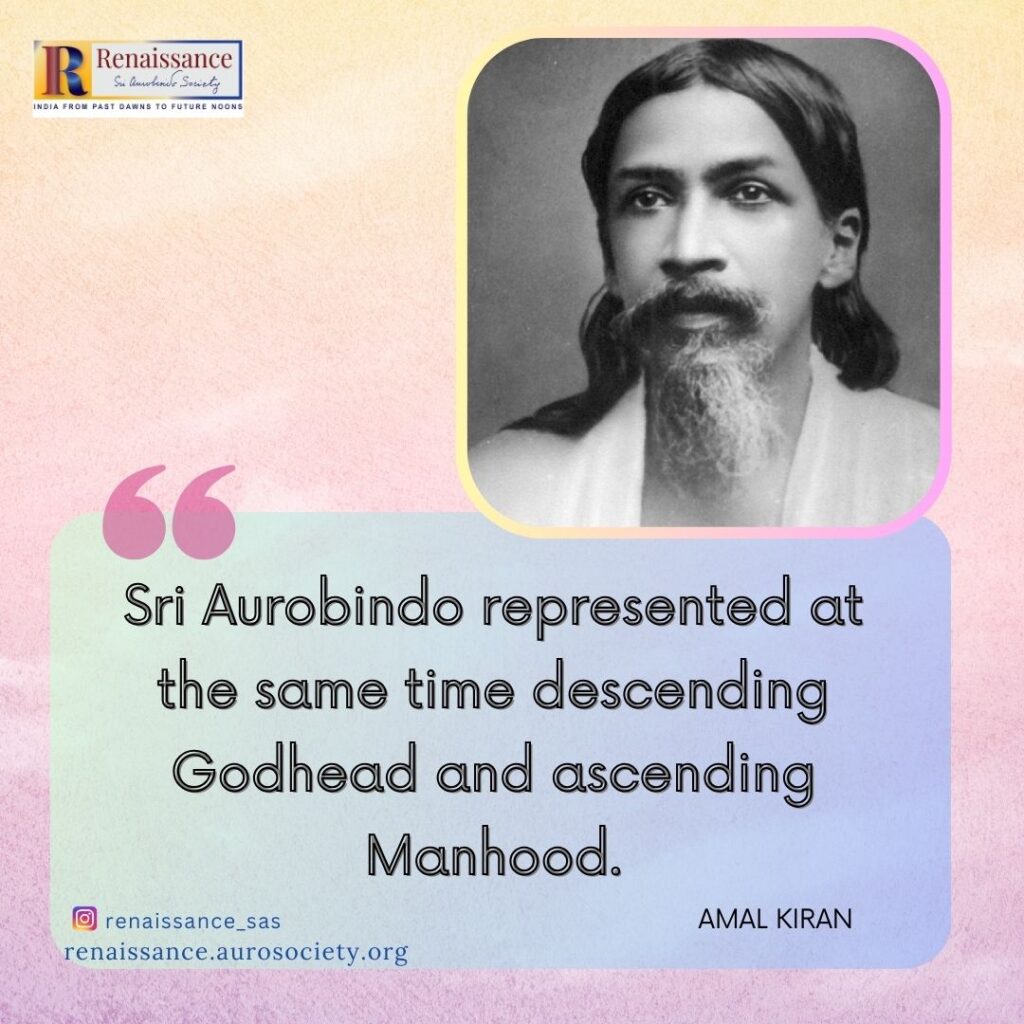
All through his own ordeals — the trials of a spiritual pioneer, the first invoker and realiser of the hitherto unmanifest “Supermind” which holds the original truth, the perfect model of every term of the cosmic evolutionary travail, all through the challenges of his Yoga he had the liveliest sense of humour.
The transcendental Bliss of the mystic in him he humanised into a laughter ready for any occasion. He has even joked unreservedly about himself. And his divine levity has often shot with sunshine the clouds in which so many of his disciples got wrapped time and again.
When my friend Nirodbaran, whom he had dubbed “Man of Sorrows”, wrote to him after a Darshan: “Your Himalayan austerity and grandeur take my breath away, making my heart palpitate”, he replied: “O rubbish! I am austere and grand, grim and stem! every blasted thing I never was! I groan in an un-Aurobindian despair when I hear such things. What has happened to the common sense of all you people?”
Our age is one in which old pomp and ceremony are laughed to scorn. Sri Aurobindo’s laughter has never been derisive, but he has made light of conventions and creeds that have outlived their use.
* * *
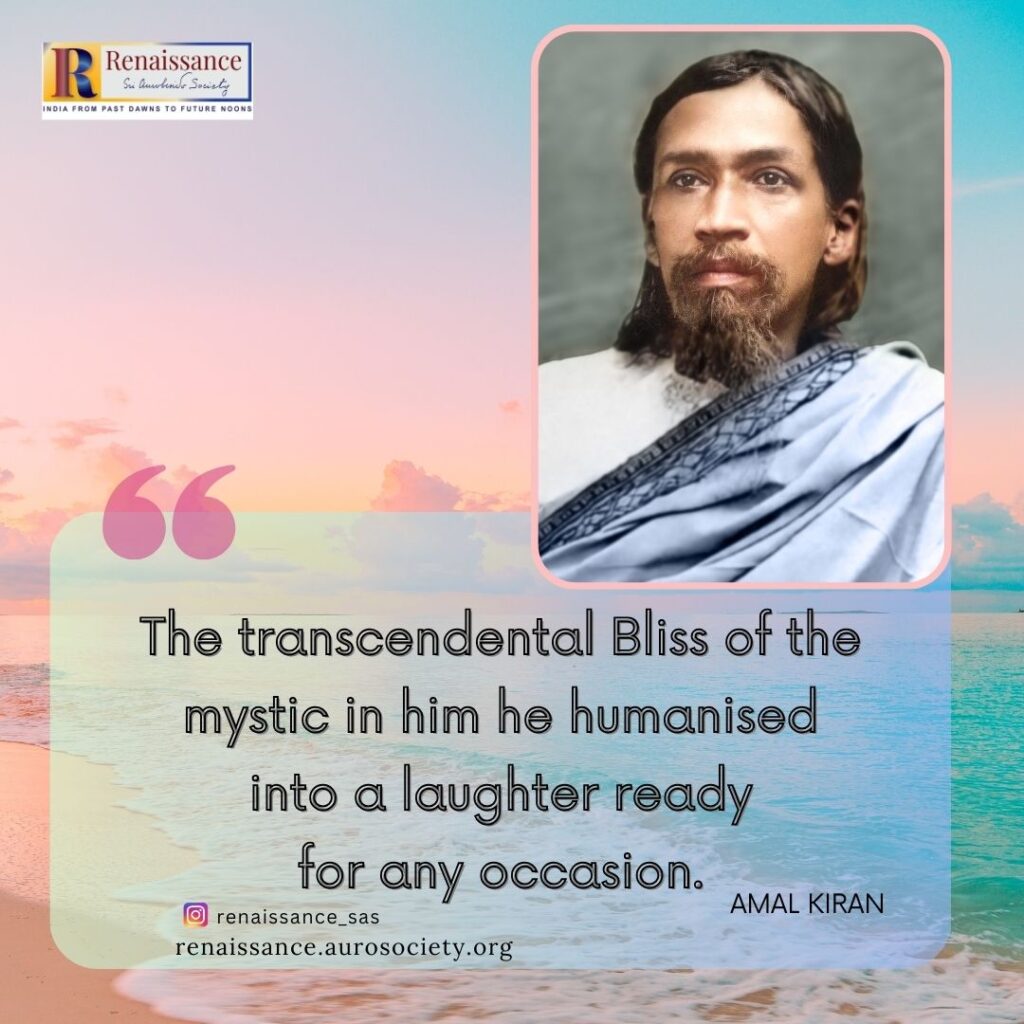
The period in which he was educated in England from his seventh to his twenty-first year was, as he put it, “the heyday of materialism”. The mind of materialism has been simultaneously a liberator from age-long superstitions that curb the scientific drive of rationality, and a confiner within a new dogmatism of physical experiment and mathematical formula.
Sri Aurobindo, the evolutionary Avatar, could not but allow the representative currents of modern thought to run through his being and come forth transfigured.
In his early life he passed through a genuine phase of agnosticism.
So he knew intimately how to deal with a mentality such as mine had once been. He has spoken of gigantic doubts through which he had to cut his way to spiritual certitude. He has even said, incredible as it may seem from the lips of the greatest contemporary Yogi: “I had no urge towards spirituality in me, I developed spirituality.” And he has followed up with the words:
I was incapable of understanding metaphysics, I developed into a philosopher. I had no eye for painting—I developed it by Yoga. I transformed my nature from what it was to what it was not. I did it by a special manner, not by a miracle and I did it to show what could be done and how it could be done. I did not do it out of any personal necessity of my own or by a miracle without any process. I say that if it is not so, then my Yoga is useless and my life was a mistake—a mere absurd freak of Nature without meaning or consequence.
~ CWSA, Vol. 35, p. 412
Here, in the universal significance, the lesson of aspiring will-power for the whole world, with which he, who bore within himself the supreme status that has need of nothing, filled the labour of his incarnate days — here is what Sri Aurobindo preeminently means to me.
Read more by the author:
The Series of Avatars and Avatar of the Future
~ Design: Beloo Mehra

